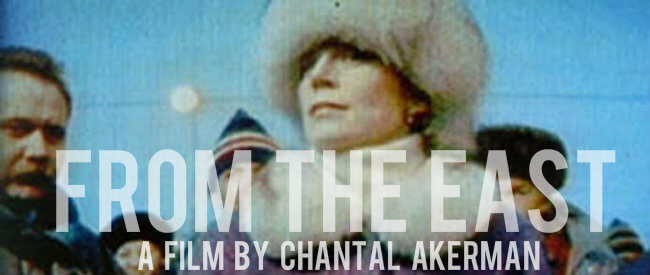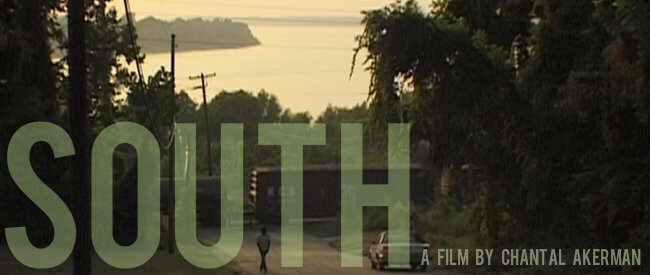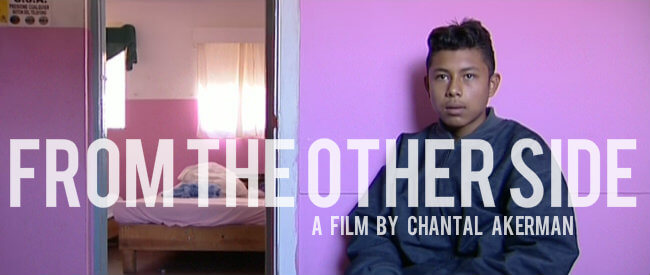Chantal Akerman’s “directional” documentaries are concerned with borders: the porous outline between place and person. As in all of her work, her sensitivity to place and time are awe-inspiring — she has an innate ability to subsume the viewer in details; her camera remaining unobtrusive as she struggles between objectivity and subjectivity behind it. Thanks to the cooperation of Icarus Films, who released La-bas (Down There), since our last iteration of this series, we are proud to once again showcase these later works from one of the most compelling and influential filmmakers. They remain timely as ever.

FROM THE EAST
aka D’Est
Dir. Chantal Akerman, 1993
France/Belgium, 110 min.
Shortly after the collapse of the Soviet bloc, and “before it was too late”, Chantal Akerman made a journey from East Germany in late summer, across Poland and the Baltics, to deepest winter in Moscow, “filming everything that touched me”. Tracking across city streets, landscapes, and faces, the film also takes us inside the private spaces of the countries’ inhabitants, where they peel potatoes, watch old TVs or stoically stare down the camera.
TUESDAY, JUNE 26 – 7:30 PM
SATURDAY, JUNE 30 – 10 PM
Akerman takes satisfaction in the demanding nature of her films. Most directors feel complimented, she has said, when viewers say they are not aware of passing time: “But with me, you see the time pass. And you feel it pass. You sense that this is time that leads towards death… I’ve taken two hours of [your] life.” – Film Comment
While taking a minimalist approach to its form, FROM THE EAST is rich in content, with fascinatingly culturally specific settings, music and images creating an entertainingly retro and unexpectedly moving experience.

SOUTH
aka Sud
Dir. Chantal Akerman, 1999
France/Belgium, 70 min.
In English.
WEDNESDAY, JUNE 6 – 7:30 PM
TUESDAY, JUNE 12 – 7:30 PM
THURSDAY, JUNE 14 – 7:30 PM
Chantal Akerman originally planned to make a meditative film on the American South. On June 7th, 1998 in Jasper, Texas, only days before filming began, James Byrd, Jr., a black man aged 49 was brutally murdered by three white men. Byrd, after being severely beaten, was chained to the back of a pickup and dragged three miles down an asphalt road. What was left of his body was dumped in front of a black cemetery.
SOUTH is a quiet portrait of the town of Jasper and its residents. Rather than focusing on the aftermath of the killing on national politics or the murderers themselves, Akerman centers on the environment of Jasper and the people affected by Byrd’s death. Akerman was allowed to film Byrd’s funeral and the ceremony is a considerable segment of the film.
Akerman writes, “How does the southern silence become so heavy and so menacing so suddenly? How do the trees and the whole natural environment evoke so intensely death, blood, and the weight of history? How does the present call up the past? And how does this past, with a mere gesture or a simple regard, haunt and torment you as you wander along an empty cotton field, or a dusty country road?”
SOUTH is constructed of static shots and long pans along country roads interspersed with interviews with townspeople. The structure of the interviews feel somewhat naïve if one were to focus more acutely on the politics of the racially motivated murder. Through what could have been a lack of probing, the interviewees talk uncomfortably around issues, and Akermans’ concern with not interfering obstructs deeper analysis.
Nonetheless, Akerman is a tourist and an outsider, and she seems aware of this. SOUTH could be considered a contribution to a cinema, including Alain Resnais’ fictional HIROSHIMA MON AMOUR or Alexander Kluge’s BRUTALITY IN STONE, that attempts to recognize human suffering while being critical of its representation. Though, as a documentary, the film raises slightly different questions. Is it possible in documentary to construct representations of someone’s pain, and if so, is this ethical?

FROM THE OTHER SIDE
aka De l’autre côté
Dir. Chantal Akerman, 2002
France/Belgium/Australia/Finland, 99 min.
In English, Spanish and French with English subtitles.
WEDNESDAY, JUNE 6 – 10 PM
WEDNESDAY, JUNE 20 – 10 PM
TUESDAY, JUNE 26 – 10 PM
FROM THE OTHER SIDE looks at the situation of Mexican immigrants at the border between Agua Prieta, a Mexican border town in the state of Sonora, and Douglas, Arizona, the city on the other side. The first half of the film is set in Mexico. Between static and tracking shots of desert landscapes and the border wall, Akerman interviews people who plan to or have attempted to cross the desert into the US, including a young boy in an orphanage. She quietly interviews an older couple whose son died in the desert when his group lost their way.
Similar in structure to her earlier film SOUTH, and stylistically reminiscent to FROM THE EAST, FROM THE OTHER SIDE feels perhaps the most active. By physically crossing the border and filming on both sides, we experience Akerman’s and our own ease of travel between, as well as witness the shift into the militaristic and racially skewed reality existing in Douglas, Arizona. While in Douglas, Akerman interviews a Mexican consulate, the sheriff and paranoid white locals.
Through Akermans’ signature steady gaze, she “insists” – we have no choice but to look, think, settle into the image, and to let the image settle in; in a way the length of the shots summon respect for the person on the screen. In one scene, per his request, a man reads a pained statement among his traveling companions in a cafeteria. He tells us why his group is migrating and what the journey has been like for them. Akerman says, “You have to be really like a sponge when you make a documentary.” FROM THE OTHER SIDE urges the viewer to be porous.

DOWN THERE
aka La-bas
Dir. Chantal Akerman, 2006
France/Belgium/Israel, 78 min.
SUNDAY, JUNE 17 – 5PM
SATURDAY, JUNE 30 – 7:30 PM
According to director Chantal Akerman, she never planned to make a film in Israel. She was convinced that neutrality does not exist and that her subjectivity would get in her way. She was sure she would only be able to reflect on ‘the Israel question’ while she was outside the country.
It was only when she taught at the University of Tel Aviv, picked up a camera and ‘found’ suitable images that she decided to make a film. Akerman spends a brief period on her own in an apartment by the sea in Tel Aviv. She takes the chamber play to its ultimate form: it is almost entirely chamber. She films from the apartment and in her narration she talks about her family, her Jewish identity and her childhood. She wonders whether normal everyday life is possible in this place and whether filming is a realistic option. Akerman does not film here with any intentions defined in advance. She wants to be as open and blank as possible to ensure that things take their own course. – Icarus Films
“What’s remarkable is the degree to which Ms. Akerman uses the interplay of place and displacement to wrest beauty from despair.”—J. Hoberman, The New York Times
“La-bas at first seems painfully esoteric, but for those with patience there is, as promised, a pay-off.”—Frieze Magazine
“One of the great documentary self-portraits.”—Richard Brody, The New Yorker
